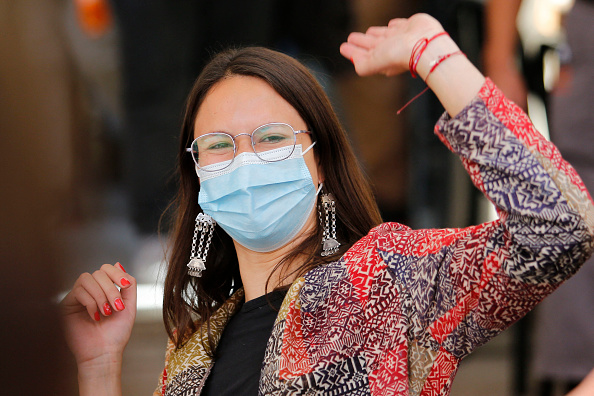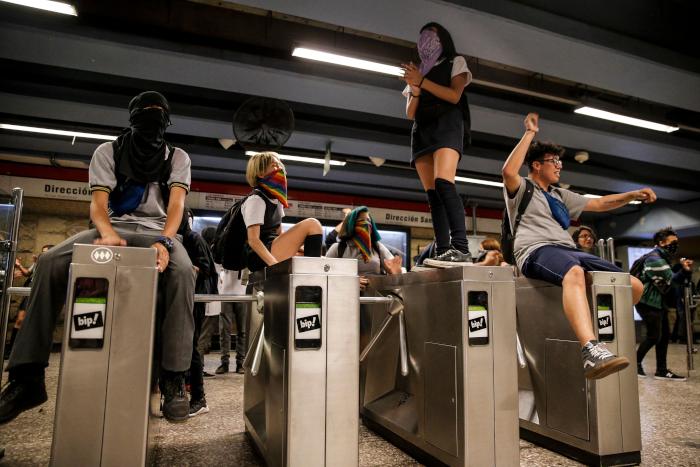

The Country of Chile Will Have the First Truly Modern Constitution
By Alberto Cox Délano | Politics | May 19, 2021 |
By Alberto Cox Délano | Politics | May 19, 2021 |

How can you start writing down this much joy, relief, and hope? Let’s start by not burying the lede: In a small country beset by unremarkableness, the little man won. Now let me put it into a more subdued language: The country of Chile has decided to write a new Constitution, which will probably be the most democratic and representative in history, and maybe, just maybe, it could be the most progressive one.
But then again, what should be the point of this article? Who is to be the target audience? How can I write about a Constitutional Process in a way that is compelling to as many people as possible? Because by dog, do I want people to hear this good news. But then again, how can I make this relevant to a mostly English-speaking audience in their own very different, very particular historical and political contexts? Don’t get me wrong, I know for a fact that the readers of this site are educated and knowledgeable, they quite likely know Chile as a country first. They probably know about the dictatorship, Allende, and our authors. We have a history of being isolated, by geography and by size, it is so hard to make ourselves heard. We are kinda like the cult-band of countries: Not many have visited us, but each and everyone who did became a South American-phile.
But how can I explain the entire history of how we came to this moment where we will, for the first time, have a foundational document that represents the entire country? Considering how things are going in the USA and the UK, this might come as if I’m teabagging y’all with our social progress. But then again, I need to tell you this, because what I’m feeling is just pure, non-toxic pride.
Once again, I feel an inkling of doubt. How do I tell you about this entire process without turning it into a paper on the entire recent history of Chile? Because this is the closing chapter of a 50-year long story, of a president who wanted to start a democratic revolution in yet another deeply unequal, casteist country, a historical project deposed by an elite, that comes not from the same set of universities, but the same set of private schools, to this day (which I too am part of). Then I would have to sum up 32 years (my age!) of a stable return to democracy, where progress was made, but weighed down by a viciously antidemocratic Constitution written and imposed during 17 years of dictatorship, devised to be unrepresentative of the popular will, even after hard-fought modifications; years in which the most savage version of the neoliberal model bored holes into our souls as a country, compounded by the trauma of the dictatorship. And then I would have to subsume 10-15 years of social mobilizations, starting always, always, always with the students, high schoolers, or university, waking up the things our parents had to hush. It’s always the students.

El comienzo: pic.twitter.com/F5kz0ZH7Cz
— Alejandra Costamagna (@alecostama) May 17, 2021
On top of that, I would have to give you a briefer on the two years or so, since October 2019, of a social uprising, against the second term of a right-wing billionaire, that has left dozens of dead, given us a whole new trauma, radicalized the conversation, made me realize how right MLK was about the attitude of white moderate, and caught the Chilean elite by surprise even though they were told over and over and over again this uprising was bound to happen. In the midst of that, this isolation felt larger and this size felt smaller, there was no #SOSChile trending for days. We never felt more like we were on our own.
One thing was clear, we needed a new playbook to even consider making this country better and fairer. So, during the worst of the crisis, the political parties were compelled to sit down and call for a referendum on April 2020 on whether we should have a new constitution, a constitution to be drafted by an Assembly or Convention of members voted by the people.
And then the pandemic struck, and it was terribly handled. We got a glimpse once again into how little the elites and the right wing government cared for how most of us live. Barely any aid was given, and we were forced to eat our savings, literally; laws had to be passed for us to draw 10% amounts from our privatized retirement funds, which are terrible anyway and it’s not like most of us are going to be able to retire.
In the midst of this, the electoral system of the Constitutional Convention was defined. Chicanery and obstructionism by the right-wing persisted, but two things were guaranteed: Gender parity between representatives and 17 out 155 seats were allocated to our Indigenous Peoples, ever postponed, ever oppressed, who would now have a voice. It was not perfect, we could not guarantee representation for Afro-Chileans, people with disabilities, and the LGTQBI+ communities. But I guess new things will always have to be built in some of the constraints of the past. The pandemic forced us to postpone the plebiscite to October. Made more sense, we always held elections in spring. On that day, for the first time in years, we had massive participation, especially in the poorer, disillusioned districts. It wasn’t the most — just 50% of participation — but it all looked promising
It was, after a barrage of terror propaganda by the right, a New Constitution was approved by 78% of voters. Every single district voted yes in the plebiscite, save for two frontier ones inhabited mostly by army people, and the three districts where the Chilean elite lives, works, and mostly doesn’t leave.
We skip to 2021, the election of the Constitutional Assemblymen and women would be held in April, along with the also postponed election of mayors, governors, and district councilors. You guessed it, it was postponed again as we experienced the second wave of the pandemic. But only for a few weeks, to last Saturday and Sunday. It was a haphazardly move; the government made no effort to promote the election, the left went divided into multiple lists and pacts, including several independents. On the weekend itself, the weather was miserable, the pandemic is far from over (despite a great vaccination effort), the government vetoed efforts to make Saturday a mandatory holiday, public transportation was free, but suspiciously unavailable in some places … and turnout was down to 41%. We were worried we had blown it, as it is the rule everywhere, the more people vote, the less chance the right has to win.
Boy, were we up for a surprise. The best kind of surprise, a goddamn miracle.
First, massive wins in the mayoral races for the new, democratic-socialist, non-establishment left in the districts: To put it in New York terms, we won the district equivalents of Queens, Brooklyn, and Manhattan from rightwingers, including a family legacy one and an Ivanka type. Downtown Santiago, in particular, was won by a communist. Then we had our equivalent of Miami won by a community organizer very much like AOC. All Millenials. That was just the appetizer.
The Constitutional Convention, to become the most important historical moment and movement in our history, well, let’s say the right-wing got trounced biblically. As part of the compromise for the process, proposals in the new Constitution could be vetoed by one-third of the members. The right wing’s goal was just to cross that threshold, have over 52 members elected and try to keep any structural transformations to a minimum.
They only got 37 seats. Plus three representatives from the seats reserved for Indigenous people. They might have a few centrist independents. Maybe.
They don’t have the votes. After decades of obstructionism, the Chilean right-wing doesn’t have the votes.
THEY DON’T HAVE THE VOTES.
Did I mention they spend bucketloads of money comparatively? US$8 million or so, for a string of losses, or wins in places where they were guaranteed representatives. Meanwhile, there is an elected, left-wing representative that only spent about US$800.
And then we get to the good stuff. The establishment center-left, which I still begrudgingly respect because my mum is a lifelong supporter, got 25 seats, 15 of which went to the Socialist Party. My faction, which includes the Communist Party, Democratic Revolution (the party I’m registered with) among others, got 28. And we were just coming out of an internal crisis!
But the biggest surprise, the one not a single analyst predicted, was the success of the independents, with over 48 representatives, 26 of which belong to a populist, very much leftist “People’s List”. They can be … a lot, but still, left is left. Then another 11 went to a center-progressive group of renowned and respected public figures. And then there are another 11 we don’t know much about. Probably centrists. And of course, most of the indigenous representatives fall somewhere in the center to left spectrum. Someone did the strenuous job of placing the representatives in the political compass chart and it looks like this:
LO HICE AMIGOS
— J.🤡 (@Ascetic0) May 18, 2021
LOS 155 CON NOMBRE, APELLIDO, PARTIDO Y POSICIÓN POLÃTICA
Los 3 con signo "¿?" Son miembros de pueblos originarios cuyo domicilio político es un enigma.
*obvio que hay errores, no es un paper https://t.co/jYoBQcMJkY pic.twitter.com/5MASLgi16s
Also, the vast majority comes from Public, Charter/Semi-Public or non-elite private schools. That’s a first in our political history. Is this what hope looks like? Do you know how weird it feels to wake up to a day of just good news? Because there’s a third election still. The agreement requires that once the Convention has drafted the new Constitution, it is to be approved or rejected by another referendum. If we lose, we’re back to the old one. I wanna believe that you can’t just stop this much spring. But I’m always cautious.
I don’t know if we Chileans are particularly fatalist, but we tend to be distrustful because that’s the deal history has given us. We are the kind of people that sucks in our emotions; we have been known to roll with the punches even before the dictatorship, quite literally. Thus, when we erupt, when we finally show ourselves and we let our emotions flow … sometimes it ain’t pretty, sometimes it feels as the only thing we Chileans can feel is exhaustion, anger, and anxiety. And disappointment, because we are also, through and through, excitable, sunny romantics. Or being Irish, as it is also known.
Has this been too much? Have I just given a situational report without a thesis to sustain it? I will finish this by singling out two of the elected representatives for the Indigenous Peoples, both representing the Mapuche, the largest one. First is machi (spiritual leader) Francisca Linconao, a human rights and environmental activist, who won a landmark case against a logging company and was spuriously accused and absolved of assassination charges. She just keeps winning at life.
And then another lamngen (sister in Mapudungun), Doctor Elisa Loncon, a scholar and University professor, dear to my heart as I took her course on Mapuche Language and Culture at the Uni. She’s a wonderful person and a brilliant, powerful voice. She and Linconao might lead us to finally recognize ourselves as a plurinational country, we might finally give official recognition to the original languages of this land.
Oh, and that we will have the first Constitution in human history written by an equal number of men and women (77 to 78, but you get the point). We Chileans are NEVER going to shut up about that one. That’s going to be the “I went to Harvard” of introducing where you come from. If you ever find yourself with a Chilean in the future, you will be beaten over the head with this.
Anything else, any actual message before I cross 2,000 words? Anything that we readers at Pajiba can work with?
Yes, I guess. That whatever happens, it was worth it. This is how you can build true pride in your country. Please, do copy us at will.
← Colbert Mocks Mask Confusion In A Way A Nerd Like Me Can Really Understand | JLo vs. ARod: When a Power Couple Splits and the Media Battle Begins →
More Like This
Video Games Are Art and That's Okay
Nu Metal Can't Be Back Because It Never Left
Queerness Is a Gift
The Norman Lear Center Released A Report About Hollywood Gun Violence
If It's AI, It Isn't Art

Another Day, Another 'Real Housewives' DUI
'The Office' Reboot Adds 'Nathan For You' Co-Creator
The Experiment With Diversity Is Over in Late Night TV, Suggests Dulcé Sloan
Jordan Klepper Got A "Glimmer Of Hope" From A Trump Supporter
Leave Josh Peck Alone, Says Drake Bell in the Wake of 'Quiet on the Set' Revelations
Sophie Turner Has ‘Reactivated’ Her Divorce From Joe Jonas
More Like This
Video Games Are Art and That's Okay
Nu Metal Can't Be Back Because It Never Left
Queerness Is a Gift
The Norman Lear Center Released A Report About Hollywood Gun Violence
If It's AI, It Isn't Art
Reviews